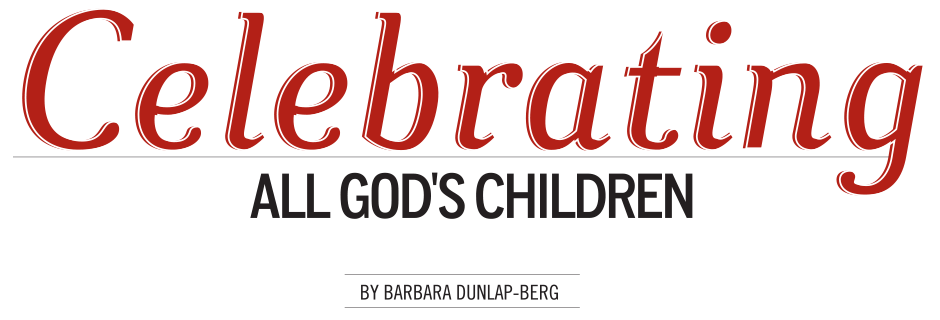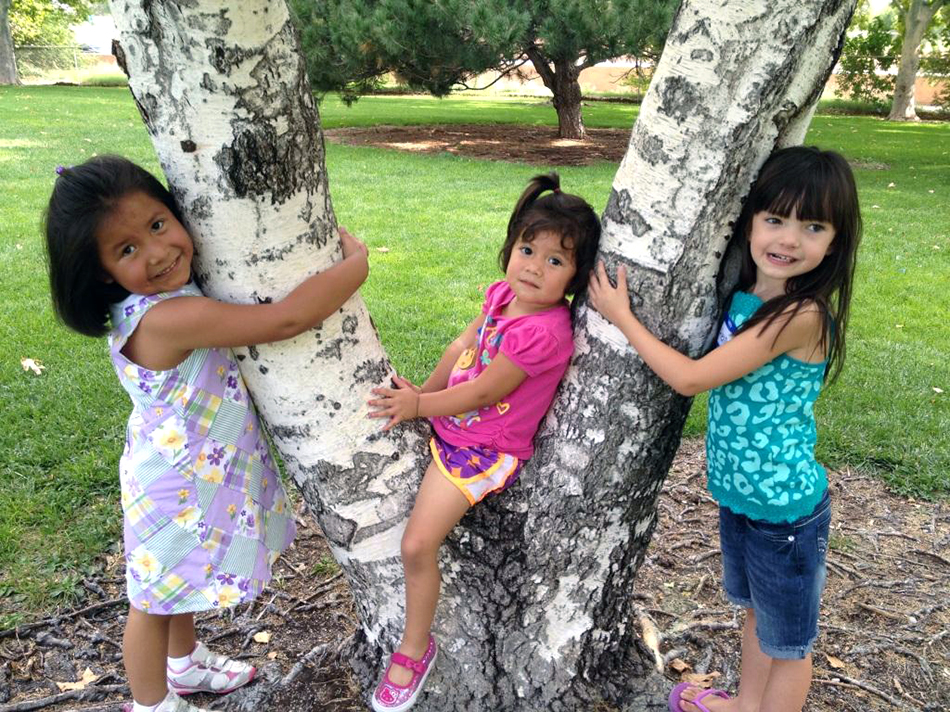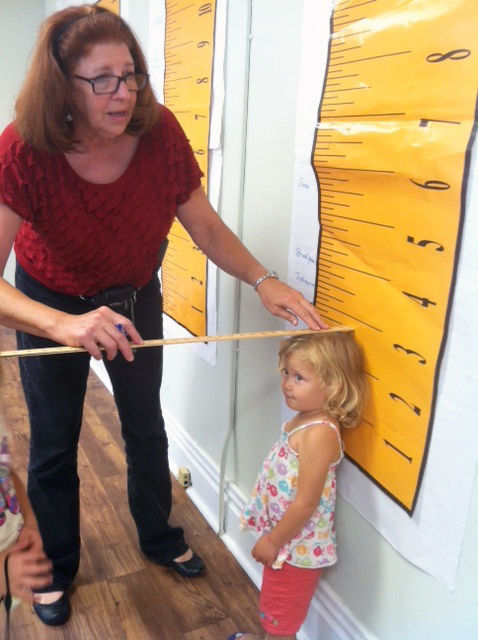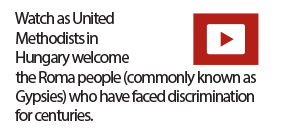



Through the Saranam ministry at Central United Methodist Church, Albuquerque, N.M., children meet new friends in a new community.
COURTESY CENTRAL UMC

Through the Saranam ministry at Central United Methodist Church, Albuquerque, N.M., children meet new friends in a new community.
COURTESY CENTRAL UMC

Coral Romero, youth band member and guitar teacher at Christ’s Foundry United Methodist Church, helps Guitars with Grace student Kevin Landlin with his fingering.
UMNS/SAM HODGES

Coral Romero, youth band member and guitar teacher at Christ’s Foundry United Methodist Church, helps Guitars with Grace student Kevin Landlin with his fingering.
UMNS/SAM HODGES

Margaret Madison measures a child during vacation Bible school at Church for All People.
COURTESY THE CHURCH FOR ALL PEOPLE
Reading from the prophet Isaiah, Jesus said, “The Spirit of the Lord is upon me, because the Lord has anointed me. He has sent me to preach good news to the poor, to proclaim release to the prisoners and recovery of sight to the blind, to liberate the oppressed” (Luke 4:18, CEB).
Across the United States and around the world, United Methodists “preach good news to the poor” through a variety of ministries. Ministry with the Poor is one of the denomination’s four priority areas of focus, and the General Board of Church and Society and the General Board of Global Ministries are leading the way.
United Methodists from 16 conferences in 12 states gathered in May 2014 at the Church for All People in Columbus, Ohio, to participate in “Crossing Boundaries: A Conference for the Poor and Those Who Work Alongside Them.”
“Crossing Boundaries” grew out of two roundtables with practitioners and conference staff hosted by Bishop Michael McKee in Dallas and Bishop Sally Dyck in Chicago. The goal was to strengthen and expand the network of practitioners engaged in ministry with the poor, learn from each other and identify additional Ministry with the Poor trainers and training sites.
Central, Albuquerque
The Rev. Greg Henneman, associate pastor of Central United Methodist Church, Albuquerque, N.M., attended the Dallas roundtable in November 2013, sponsored by Church and Society and Global Ministries. Funding from his church and the New Mexico Annual Conference allowed him to take a team to the May 2014 “Crossing Boundaries” training in Columbus.
Central is located across the street from the University of New Mexico. Its 1,000 members are primarily middle- to upper-middle class. However, said the Rev. Scott Sharp, senior pastor, “Our location affords us contact with many transient, poor and homeless persons. On a Sunday morning in the fall, there are people in fur coats and people carrying all of their belongings on their backs in our worship services.”
When Henneman joined the staff in 2009, the mission ministry began to evolve from a catch-as-catch-can effort to comprehensive outreach. The first program was an outdoor worship ministry for homeless people.
“We began to talk about it with the congregation,” Sharp said. “We recruited volunteers. In February 2011, we launched what became Community of Hope. That ministry now is a worship service and meal every Sunday afternoon on the south lawn of our church.”
But it’s not just ministry to the poor, he noted.
“Everything we do is related to conversation, relationship building and getting to know one another.”
Today, Central offers a full spectrum of ministries with the poor and the homeless.
“We have engaged the local elementary school — a very poor school — and have a daily running program with the students called Mighty Milers, and a monthly mobile food pantry that feeds about 300 people,” Sharp said. “We have a four-day-a-week ministry called Helping Hands that offers sack lunches, bus passes, coffee and conversation.” Saranam, a two-year residential and educational program for homeless families, is 11 years old.
“Too often,” Sharp said, “we have a limited view of what the church can do, and fear about ‘scarce’ resources often surfaces. Several years ago, as our ministry with the poor was really starting to ramp up, we heard some complaints about ‘those people’ in the church, but that has gone away.
“Central’s ministry with the poor has become one of the things that we are really known for in the community,” Sharp said. “We put a lot of energy into it, and that energy requires financial and human resources that are limited.”
The general church and the annual conference have provided financial assistance.
“Ultimately,” Sharp said, “the rich and the poor have to worship together, be together, learn together and be shaped in discipleship together.”
Christ’s Foundry, Dallas
“Our congregation is of the poor and for the poor,” said the Rev. Owen K. Ross, pastor/missionary at Christ’s Foundry United Methodist Mission.
The congregation’s more than 200 members represent the urban poor, Hispanics and young immigrant families who are involved in a gamut of ministries for all age levels.
“Most of our churches are willing to go to, rather than invite the poor to be a part of the full lives of their congregations,” Ross said. They are “comfortable in interacting with the poor in a soup kitchen but not necessarily in their children’s Sunday school class.”
Ross does not draw a distinction between ministry with the poor and other church outreach, saying simply, “They are one and the same.”
He participated in the Dallas roundtable and brought a team from his church to “Crossing Boundaries,” thanks to funding from the North Texas Conference. In Columbus, Ross led a workshop on “Evangelism and Ministry with the Poor,” the subject of his doctoral dissertation.
“Ministry with the poor is discipleship for those serving and a means of making new disciples through service,” he said. The new paradigm aligns social services with discipleship ministries.
Funds received through the United Methodist connection have aided Christ’s Foundry Mission. “We have received grants throughout our 12-year history for our work with leadership development,” Ross said.
Church for All People, Columbus, Ohio
The United Methodist Church for All People on the south side of Columbus, Ohio, seems the perfect training site for ministry with the poor. A third of the households live below the federal poverty level. Unemployment is nearly 20 percent. One-third of the community is younger than 18.
“Our flagship direct service, the Free Store, launched in 1999 and has served more than 150,000 since its inception,” said the Rev. Karen Cook, associate pastor. From that, other ministries emerged, including affordable housing, youth development, health and wellness, Bikes for All People and community gardens.
A breakfast ministry — Feeding by Faith — began in 2002. One man had a vision of reaching out to homeless individuals in downtown Columbus by offering hearty food. People from the church made and delivered breakfast sandwiches to locations by the river. Their goal, Cook said, was “to make contact with homeless folks.”
When the response was disappointing, a church staff member suggested the crew bring food to the Free Store, where there was always a crowd on Saturday mornings. It was an instant success. Four teams of volunteers now rotate duties, serving an average of 150 meals each week.
“Our lived theology in this regard is fully Wesleyan,” she said, “as we encourage individuals to experience the fullness of God’s grace in their lives, moving through the Wesleyan progression of prevenient grace leading to justifying grace and ultimately unfolding in sanctifying grace, where folks embrace the call to follow in Christ’s steps as servant leaders.”
Four-days-a-week worship experiences, Cook said, represent the “many channels we use to invite people to become full participants and, ultimately, professing members. Two-thirds of the members of our growing congregation are low-income persons who have come to know the love of Christ through our community development ministries.” Worship attendance averages 280 people a week.
The Church for All People sees every individual as an asset. The challenge, Cook said, is to help others see “all people” with worth, value, assets and gifts.
“Embracing the assets of all people continues to make a positive impact on our community,” she continued. “The two essential and universal assets in any endeavor are the people in the community and the dynamic presence of God’s Spirit.”
Barbara Dunlap-Berg is associate editor, Interpreter, and general church content editor, United Methodist Communications.
Learning opportunities
In September 2014, Global Ministries funded a planning session in Little Rock, Ark., for Ministry with the Poor practitioners from five locations to design regional experiential trainings to host in 2015 at their locations. The preliminary list of regional training sites includes Columbus, Detroit, Houston, Little Rock and San Francisco.
An October 2014 Summit on the Black Church, hosted by the South Carolina Conference and attended by about 200 people, was devoted to equipping and resourcing congregations to engage in ministry with, rather than to, the poor.
“That conference,” said Mary Ellen Kris of Global Ministries, “has made a commitment to children and poverty, with a particular focus on stamping out childhood illiteracy.” The starting point is Bishop Jonathan L. Holston’s Million Book Campaign, an entry point for churches to form relationships with severely under-resourced schools and children living in poverty. In addition, the Greenville District of South Carolina has a begun a Ministry with the Poor [initiative] that encourages all of the churches in the district to form a relationship with at least one low-income family in the district.”
During 2014, Global Ministries also recruited 25 practitioners to attend a 60-hour certification program to become coaches teaching others to develop multiclass, multicultural congregations. They will complete their training and be certified in January 2015.

